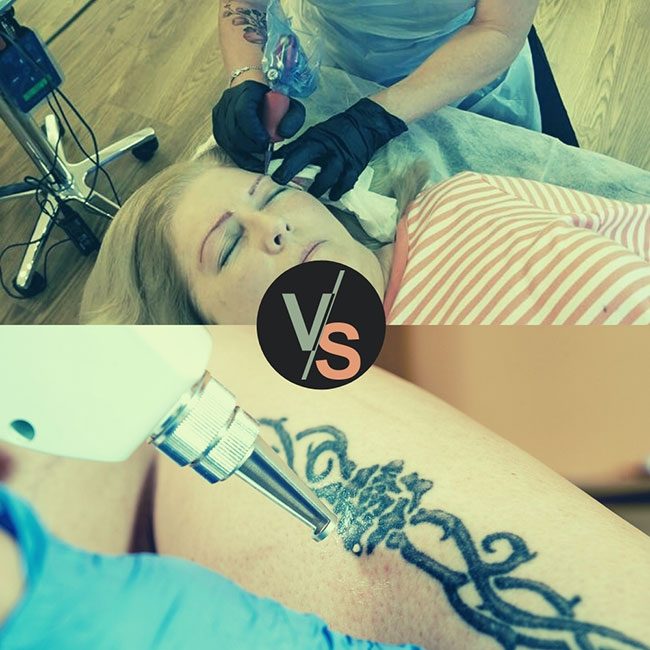Corrections can be made with color and shape if the pigment is not too saturated. However, if you are looking to have your eyebrows microbladed or powdered over old, highly saturated work, you will need to have the existing pigment removed for optimal results.
There are different modalities of removal — lightening peels, dermabrasion, surgical removal, laser removal, saline removal, etc. Of these techniques, most technicians remove permanent makeup and tattoos with lasers or a saline solution. Laser removal uses intense pulses of light to penetrate the pigment, breaking it up into microscopic fragments that the body then absorbs and eliminates through the body’s lymphatic system. Different wavelengths of light are used to target specific colors, making some colors difficult to eliminate. Lasers do not target Titanium molecules that can be present in lighter pigment colors, and have the capability of turning black after a session of laser removal. Once the titanium has turned black it is solidified in the skin and almost impossible to remove. Another risk you are facing with removing permanent makeup with laser is damaging the hair follicles indefinitely. Certain wavelengths that target specific colors overlap with the same wavelengths used in laser hair removal, so the client may lose eyebrow hair or lashes during the process.
The skin in the treated area also many times will not accept pigment anymore, meaning that the area will not have ability to be re-tattooed. Saline Removal will be a better solution for most clients with permanent makeup. With proper technique, saline effectively removes the pigment and leaves the skin capable of re-tattooing the area. The hair follicles remain healthy and functioning. The amount of pain a client should expect is equivalent to their initial tattooing/microblading session. Numbing agents are used throughout the process. A saline solution is implanted into the skin by a machine or hand tool. The salt in the solution causes a magnetic pull, by means of Osmotic Pressure, on the pigment particles and forces them to the surface layers of the epidermis. The treated area will scab, enclosing the lifted pigment. And as the scab flakes away, so does the pigment. The saline method is much healthier and safer for the body, as the pigment/ink does not have to filter through the body’s lymphatic system. Depending on the level of pigment saturation, removal can be accomplished in one to four sessions, spaced eight weeks apart. Saline removal can get your skin back to a “clean slate” and ready for Microblading or Powder, to get the brows you’ve always dreamed of.

